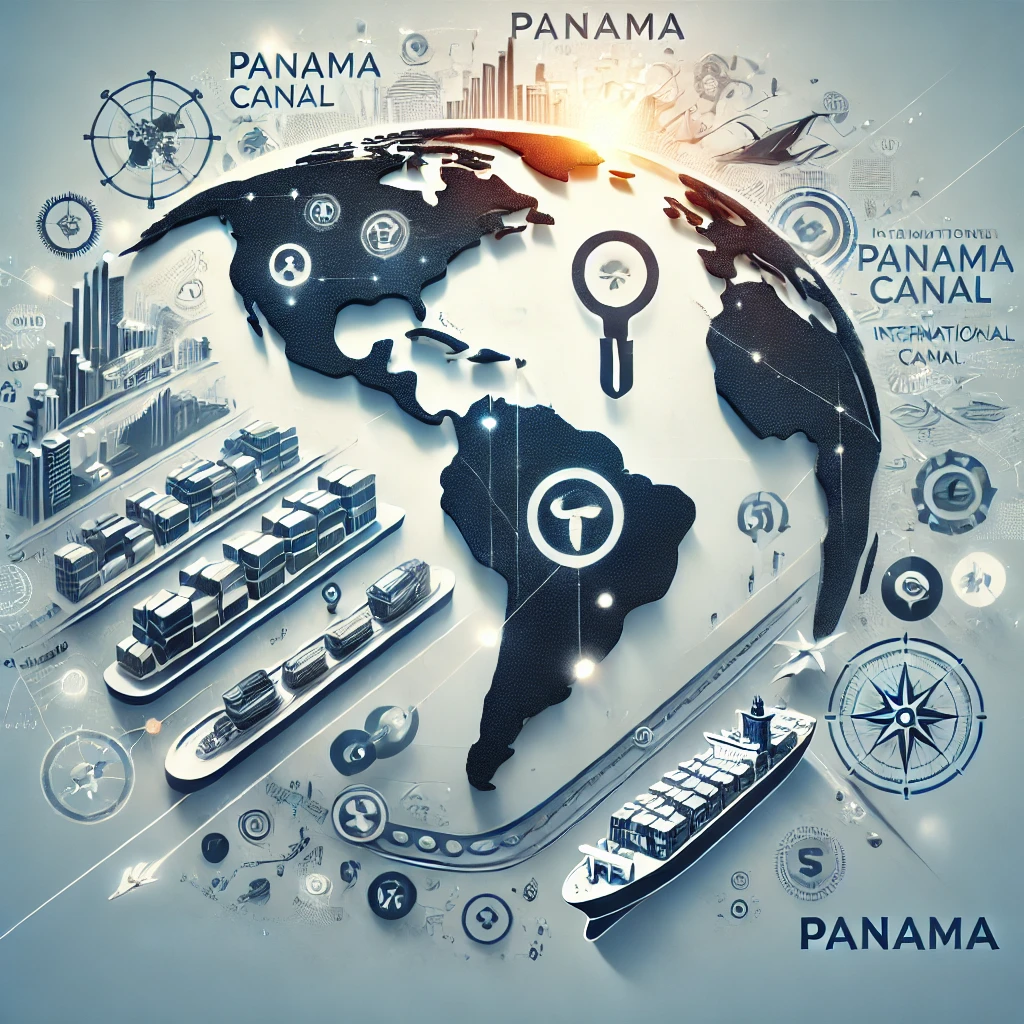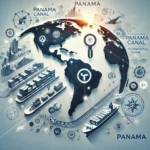Introduction:
In the dynamic scenario of offshore jurisdictions, Panama is emerging as an attractive and strategic option for international investors and entrepreneurs. Known for its privileged geographical position and its world-famous Canal, Panama has established itself as a financial and logistical center of global importance.
Recent figures show that Panama is home to more than 500,000 registered companies, including a significant number of international holding companies. This impressive volume is testimony to the confidence that global investors place in this strategic jurisdiction.
In this article, we will explore in depth the benefits and opportunities of establishing a holding company in Panama, with a particular focus on its position as a logistics and financial hub, asset protection and tax efficiency. We will address the advantages for both non-US tax residents and residents, highlighting how Panamanian structures can be a crucial component in international financial and commercial strategies.
Part 1: Ready to Roll 🚀 – Basic Strategies and Practical Actions
Part 1, “Ready to Roll”, offers practical actions and immediate advice for entrepreneurs who need quick and effective guidance.

1. Fundamentals of Holding Structures in Panama
Importance of Strategic Location and Economic Stability
Panama offers a unique combination of strategic location, political and economic stability, and a robust financial system, making it ideal for international holding companies.
Recommended Initial Methods
1.Basic Structuring: Start by establishing a Sociedad Anónima (SA) or a Fundación de Interés Privado (FIP). These structures offer flexibility and significant tax benefits.
2. Segregation of Assets: Use the holding company to manage global investments, properties or stakes in other companies, taking advantage of Panama’s territorial tax regime.
3. Logistics Hub: Take advantage of Panama’s position as a logistics center to structure international business operations.
2. Investment Strategies and Global Operations
Tips for Structuring Efficient Operations
1.Colón Free Zone: Consider using the Colón Free Zone for tax-free international trade operations.
2. Multinational Enterprise Headquarters (SEM): Explore the benefits of the SEM regime to establish regional headquarters in Panama.
3. Trading Structures: Take advantage of Panama’s strategic position to establish international trading companies.
Key Considerations Aligned with International Standards
– Be aware of reporting obligations under Panama’s tax information exchange agreements.
– Keep up to date with the regulations of Panama’s Superintendency of Banks to ensure ongoing compliance.
3. Asset Protection and Succession Planning
How to Develop an Effective Asset Protection Strategy
1. Private Interest Foundations: Use Panamanian FIPs for asset protection and long-term succession planning.
2. Trusts: Consider using Panamanian trusts as an additional tool for estate planning.
3. Hybrid Structures: Combine different entities (for example, an SA with a FIP) to maximize protection and flexibility.
The Importance of Cultural Adaptation and Consistency
– Maintain a consistent strategy, but be prepared to adapt to global regulatory changes.
– Consider Latin American cultural nuances when structuring succession plans, especially for families with a regional presence.
Part 2: Deep Dive 🤿 – Technical Depth in Advanced Strategies
Part 2, “Deep Dive”, provides in-depth analysis for those who wish to delve into the technical and complex aspects of international finance.

Establishing a holding company in Panama offers an impressive range of benefits for investors and entrepreneurs with a global vision. The unique combination of strategic location, favorable tax regime and robust financial and logistical infrastructure makes Panama a jurisdiction of choice for international holding structures, especially for operations focused on the Americas.
However, it is crucial to approach the use of structures in Panama with a high degree of sophistication and responsibility. The global regulatory landscape is constantly evolving, and Panama has made significant efforts to align itself with international standards of transparency and compliance.
For those seeking a strategic platform for their global operations, a holding company in Panama, when structured and managed properly, can offer a unique combination of tax, operational and logistical advantages. As with any sophisticated international financial strategy, the guidance of experts in international commercial law, accounting and strategic planning is indispensable for successfully navigating this dynamic environment.
When considering establishing a holding company in Panama, remember: the goal is not just tax optimization or asset protection, but the creation of a strategic platform that can leverage Panama’s unique advantages to drive efficient and compliant global operations. With proper planning and careful execution, a holding company in Panama can be a powerful tool for expanding international business, optimizing logistics operations and creating a solid foundation for sustainable growth in an increasingly interconnected world.
Conclusion
Establishing a holding company in the Cayman Islands offers an impressive range of benefits for sophisticated investors and entrepreneurs. The combination of a stable regulatory environment, world-class financial infrastructure and tax neutrality makes the Caymans a jurisdiction of choice for complex investment structures and high-level asset protection.
However, it is crucial to approach the use of structures in the Caymans with a high degree of sophistication and responsibility. The global regulatory landscape is constantly evolving, with increasing emphasis on transparency and economic substance. Cayman has remained at the forefront of these changes, continually adapting to maintain its position as a financial center of trust and compliance.
For those seeking a world-class platform for their global financial strategies, a holding company in the Cayman Islands, when structured and managed properly, can offer unparalleled benefits. As with any sophisticated financial strategy, the guidance of experts in international financial law, offshore accounting and estate planning is indispensable for successfully navigating this complex and highly regulated environment.
When considering establishing a holding company in the Cayman Islands, remember: the goal is not just tax optimization or asset protection, but the creation of a sophisticated and compliant structure that can withstand the challenges and seize the opportunities of the ever-changing global financial landscape. With proper planning and careful execution, a Cayman holding company can be a powerful tool for leveraging global investments, protecting assets and creating lasting legacies in an increasingly complex financial world.
FAQs
1. Q: What are the typical costs associated with maintaining a holding company in Panama?
A: Annual costs generally include:
– Annual registration fee: Approximately $300 USD for an SA
– Resident agent costs: Between $250 and $500 USD per year
– Director fees: Variable, but can reach $1,000-$3,000 USD per director
– Compliance and accounting costs: Can range from $2,000 to $10,000 USD annually, depending on the complexity of the structure
Total annual investment can range from $3,000 to $20,000 USD or more, depending on the complexity of the structure and the services required.
2. Q: How does Panama compare to other offshore jurisdictions in terms of reputation and compliance?
A: Panama has made significant efforts to improve its international reputation:
– Implemented stricter laws against money laundering and terrorist financing
– Adhered to international standards of fiscal transparency
– Maintains a robust and well-regulated financial system
Compared to jurisdictions such as BVI or Cayman, Panama offers a unique combination of tax benefits with real physical and operational presence, which can be advantageous in terms of economic substance.
3. Q: What are the main considerations when setting up a logistics operation in Panama?
A: When establishing a logistics operation, consider:
– Location: Free zones vs. regular areas
– Infrastructure: Access to ports, airports and the Panama Canal
– Customs regime: Benefits and requirements of free zones
– Workforce: Availability of skilled labor
– Connectivity: Telecommunications and IT infrastructure
– Government incentives: Special programs for logistics and distribution
It is crucial to work with local experts in logistics and commercial law to optimize the structure.
4. Q: How do recent changes in legislation affect holding companies in Panama?
A: Recent legislative changes include:
– Stricter KYC and due diligence requirements
– Greater transparency in relation to final beneficiaries
– Adherence to international tax information exchange standards
These changes aim to improve Panama’s international reputation, but also imply greater compliance responsibilities for holding companies.
5. Q: What are the advantages of using a Private Interest Foundation (FIP) in Panama for estate planning?
A: Panamanian FIPs offer several advantages:
– Flexibility: Similar to a trust, but with legal personality
– Asset protection: Strong separation between personal and foundation assets
– Confidentiality: Information about founders and beneficiaries is not public
– Succession planning: Facilitates the intergenerational transfer of assets
– International recognition: Widely accepted in international transactions
For international estate planning, FIPs can offer customizable and robust solutions.
6. Q: How does Panama deal with the automatic exchange of tax information?
A: Panama has adhered to international information exchange standards:
– It has implemented the Common Reporting Standard (CRS)
– It has information exchange agreements with several countries
– Maintains a register of final beneficiaries, although it is not public
Entities in Panama must:
– Maintain up-to-date information on final beneficiaries
– Comply with due diligence and reporting requirements
– Be prepared for audits and requests for information
It is crucial to keep accurate records and comply with all relevant reporting obligations.
7. Q: What are the specific advantages of the SEM (Multinational Enterprise Headquarters) regime in Panama?
A: The SEM regime offers several benefits for multinational companies:
– Income tax exemption on services provided to entities abroad
– Special work permits for foreign executives
– Tax exemption on dividends
– Possibility of operating in free trade zones
– Simplified process for obtaining visas and work permits
To qualify, the company must have assets or annual turnover of more than US$200 million globally.
8. Q: How does Panama compare to other offshore financial centers in terms of stability and reputation?
A: Panama has made significant efforts to improve its international reputation:
– Implemented reforms to increase financial transparency
– Strengthened its anti-money laundering laws
– It maintains a dollarized economy, offering monetary stability
– Has a robust and well-regulated banking sector
Compared to jurisdictions such as the Cayman Islands or BVI, Panama offers the advantage of being a real economy with substantial physical infrastructure, which can be beneficial in terms of economic substance.
9. Q: What are the specific considerations for technology companies wishing to establish a presence in Panama?
A: For technology companies, Panama offers:
– Panama Pacific Special Economic Zone, with incentives for technology companies
– Advanced telecommunications infrastructure
– Strategic location for access to Latin American markets
– Qualified and bilingual workforce
– Possibility of operating under the SEM regime for larger companies
Also consider the specific tax incentives for innovation and technological development offered by the Panamanian government.
10. Q: How do recent changes in international regulations affect Panama’s attractiveness for international holding companies?
A: Regulatory changes have had significant impacts:
– Increased international scrutiny has led to improvements in transparency standards
– Implementation of stricter laws against money laundering and terrorist financing
– Adherence to international tax information exchange standards
– Strengthened supervision of the financial sector
While these changes have increased compliance requirements, they have also enhanced Panama’s reputation as a responsible financial center, potentially increasing its attractiveness to legitimate investors seeking a stable and reputable jurisdiction.
11. Q: What are the best practices for maintaining ongoing compliance with Panamanian regulations?
A: To maintain continuous compliance:
– Keep detailed and up-to-date records of all transactions and corporate structures
– Carry out regular internal audits
– Work with reputable local law and accounting firms
– Keep abreast of regulatory changes through official bulletins and consultations with experts
– Implement robust KYC (Know Your Customer) and AML (Anti-Money Laundering) policies
– Consider appointing a dedicated compliance officer for larger companies
Proactive compliance not only mitigates legal risks, but also strengthens your company’s reputation in the Panamanian and international markets.
When considering establishing a holding company in Panama, it is crucial to adopt a comprehensive approach that takes into account not only the immediate tax and operational benefits, but also the long-term implications in terms of compliance, business strategy and global reputation. Panama offers an attractive environment for international business, combining tax advantages with a strategic location and modern infrastructure.
The key to success lies in balancing structural and fiscal optimization with solid corporate governance and full compliance with evolving regulatory standards. With proper planning and the support of experienced professionals, a holding company in Panama can serve as an effective platform for expanding operations in Latin America and beyond, offering a stable base for international business growth and diversification.

Member of the IMA (Institute of Management Accountants) – USA
Member of the AICPA (American Institute of CPAs) – USA
Member of AAII (American Association of Individual Investors) – USA
Member of AAA (American Accounting Association) – USA
Member of the FMA (Financial Management Association) – USA
These associations not only attest to Kleyton’s commitment to professional excellence, but also ensure that his knowledge is always at the forefront of international financial and accounting practices.
With a robust academic background, including a Bachelor’s degree in Accounting and MBAs in International Finance and Accounting, as well as in International Business, Kleyton offers a unique and comprehensive perspective on the global business landscape.
Through the Tartarotti Report, Kleyton invites visionary entrepreneurs and executives to connect, explore opportunities for collaboration and, together, successfully navigate the complex world of international corporate finance.







